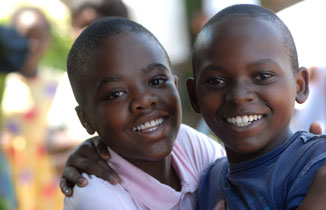Millennium Development Goals
Update: On September 25th 2015, 193 world leaders committed to new Sustainable Development Goals also referenced to as Global Goals. You can learn more here: https://www.episcopalrelief.org/what-we-do/global-goals
What are the Millennium Development Goals?
The Millennium Development Goals (MDGs) were established in 2000 to reduce the number of people who live in extreme poverty by 2015. These eight goals were developed by the international community, including leaders from 191 countries. They have also been endorsed by development institutions and religious bodies worldwide.
For more information, read InterAction’s paper on the MDGs and the international development community’s ongoing commitment to these goals.
- Eradicate extreme poverty and hunger
- Achieve universal primary education
- Promote gender equality and empower women
- Reduce child mortality
- Improve maternal health
- Combat HIV/AIDS, malaria and other diseases
- Ensure environmental sustainability
- Develop a global partnership for development
How do we use the MDGs to measure the impact of our programs?
Each of Episcopal Relief & Development’s international programs addresses one or more of the Millennium Development Goals.
We work with church and other local partners to design and maintain indicators that assess program success.
Our staff continually monitors the progress and impact of our programs against the relevant MDG targets. As a result, we are able to demonstrate how our programmatic approach and methodology is contributing to the achievement of the MDGs in the communities in which we work.
With our experience partnering with underserved communities, we are uniquely positioned to help empower program participants to transform their lives and communities.
What is our commitment to the MDGs?
The Millennium Development Goals challenge us to fulfill our mandate, found in Matthew 25.
In this passage, Jesus portrayed himself as a person suffering from the conditions associated with poverty and blessed those who responded to his needs. People didn’t remember helping him. They asked, “Lord, when did we see you hungry…or thirsty…or sick?” His response was clear: When we serve others, we serve him. “Just as you did it to the least of these who are members of my family, you did it to me.”
At Episcopal Relief & Development, we use the MDGs as a framework to guide our efforts and help us measure the impact of our programs. Each of our core program areas and all of our programs work to achieve one or more of the goals.
Episcopal Relief & Development invites Episcopalians to seize the opportunity to follow the example in Matthew 25 — to walk alongside people who are hungry, sick and suffering, and help empower them to overcome need. Partnering with Episcopal Relief & Development is a powerful and practical way to live out the promise made in our Baptismal Covenant to “seek and serve Christ in all persons.”
What is the Episcopal Church’s connection to the MDGs?
The Episcopal Church formally endorsed the Millennium Development Goals at the 74th General Convention in 2003. Three years later, the Church voted to make the MDGs a mission priority at the 2006 Convention. The Church also established a budget line item of 0.7% to support the achievement of the MDGs, and has encouraged all dioceses to pledge a minimum of their budget to ministries focused on these goals.
To find out more about the Episcopal Church’s commitment to the MDGs, visit ONE Episcopalian.
How has the Church supported Episcopal Relief & Development’s commitment to the goals?
Episcopal Relief & Development’s MDG Inspiration Fund was the first campaign to receive 0.7% of the Church’s budget, in 2006. The three-year campaign raised over $3.2 million.
At the 2009 General Convention, the Church pledged 0.7% of its budget to support our NetsforLife® Inspiration Fund campaign. The Inspiration Fund is a grassroots effort to educate, engage and unite Episcopalians to support the MDGs through the fight against malaria. The campaign goal is to build awareness about malaria prevention and raise $5 million by early 2013.





